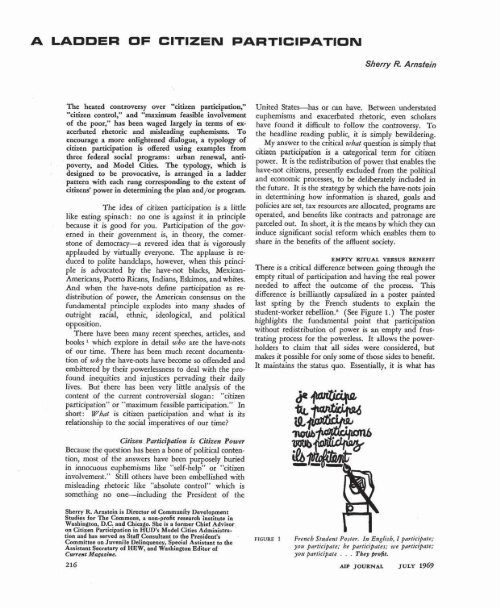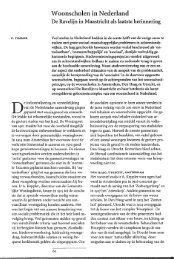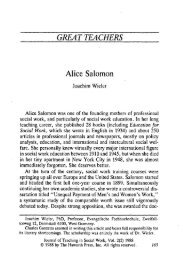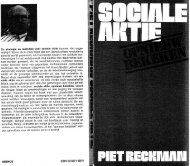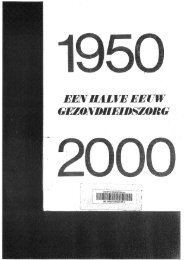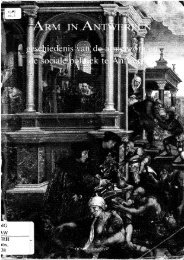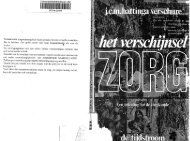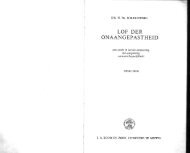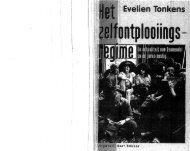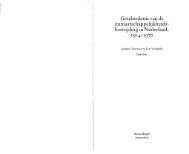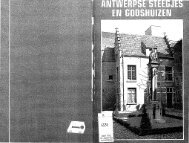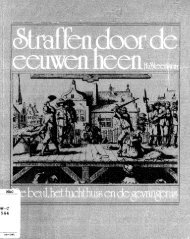A LADDER OF CITIZEN PARTICIPATION - History of Social Work
A LADDER OF CITIZEN PARTICIPATION - History of Social Work
A LADDER OF CITIZEN PARTICIPATION - History of Social Work
Create successful ePaper yourself
Turn your PDF publications into a flip-book with our unique Google optimized e-Paper software.
------------------------ Text continues after this page ------------------------<br />
This publication is made available in the context <strong>of</strong> the history <strong>of</strong> social work project.<br />
See www.history<strong>of</strong>socialwork.org<br />
It is our aim to respect authors’ and publishers’ copyright. Should you feel we violated those,<br />
please do get in touch with us.<br />
Deze publicatie wordt beschikbaar gesteld in het kader van de canon sociaal werk.<br />
Zie www.canonsociaalwerk.eu<br />
Het is onze wens de rechten van auteurs en uitgevers te respecten. Mocht je denken dat we<br />
daarin iets fout doen, gelieve ons dan te contacteren.<br />
------------------------ Tekst gaat verder na deze pagina ------------------------
ing influt:nce over the outcomt: <strong>of</strong> the plan (as long as<br />
both parties find it useful to maintain the partnuship).<br />
One community leader described it "like coming to city<br />
hall with hat on head instead <strong>of</strong> in hand."<br />
In the Model Gties program only about fifteen <strong>of</strong> the<br />
so-called first generation <strong>of</strong> seventy-five cities have<br />
reached some significant degree <strong>of</strong> power-sharing with<br />
residents. In all but one <strong>of</strong> those cities, it was angry<br />
citizen demands, rather than city initiative, that led to<br />
the negotiated sharing <strong>of</strong> power. U The negotiations<br />
were triggered by citizens who had been enraged by<br />
previous forms <strong>of</strong> alleged participation. T hey were both<br />
angry and sophisticated enough to refuse to be "conned"<br />
again. T hey threatened to oppose the awarding <strong>of</strong> a<br />
planning grant to the city. They sent delegations to<br />
H UD in Washington. T hey used abrasive language.<br />
Negotiation took place under a cloud <strong>of</strong> suspicion and<br />
fancor.<br />
In most cases where power has come to be shared it<br />
was Iden by the cilium, not given by the city. There<br />
is nothing new about that process. Since those who have<br />
power normally want to hang onto it, historica1ly it has<br />
had to be wrested by the powerless rather than pr<strong>of</strong>fered<br />
by the powerful.<br />
Such a working partnership was negotiated by the<br />
residents in the Philadelphia model neighborhood. Like<br />
most applicants for a Model Gties grant, Philadelphia<br />
wrote its more than 400 page application and waved it<br />
at a hastily caUed meeting <strong>of</strong> community leaders. When<br />
those present were asked for an endorsement, they<br />
angrily protested the city's failu re to coosult them on<br />
preparatioo <strong>of</strong> the extensive application. A community<br />
spokc:sman threatened to mobilize a neighborhood pro·<br />
test agaiml the application unless the city agreed to give<br />
the citizens a couple <strong>of</strong> weeks to review the application<br />
and recommend changes. The <strong>of</strong>ficials agreed.<br />
At their next meeting, citizens handed the city <strong>of</strong>ficials<br />
a substitute citizen participation section that<br />
changed the groundrules from a weak citizens' advisory<br />
role to a strong shared power agreement. Philadelphia's<br />
application to HUD included the citizens'<br />
substitution word for word. ( It also included a new<br />
citizen p repared introductory chapter that changed the<br />
city's description <strong>of</strong> the model neighborhood from a<br />
paternal istic description <strong>of</strong> problems to a realistic analy.<br />
sis <strong>of</strong> its strengths, weaknesses, and potentials.)<br />
Consequently, the proposed policy-making committee<br />
<strong>of</strong> the Philadelphia CDA was revamped to give five out<br />
<strong>of</strong> eleven seats to the residents' organization, which is<br />
called the Area Wide Council (AWC). The AWe<br />
obtained a subcontract from the eDA for more than<br />
$20,000 per month. which it used to maintain the neigh.<br />
borhood organization, 10 pay citizen leaders $7 per<br />
meeting for their planning services, and to pay the<br />
salaries <strong>of</strong> a staff <strong>of</strong> community organizers, planners,<br />
and othcr technicians. AWe has the power to initiate<br />
plans <strong>of</strong> its own, to engage in joint planning with CDA<br />
committees, and to review plans initiated by city agen-<br />
222<br />
cies. It has a. veto power in that no plans may be submitted<br />
by the CDA to the city council until they have<br />
been reviewed, and any differences <strong>of</strong> opinion have been<br />
successfully negotiated with the Awe Representatives<br />
<strong>of</strong> the A we (which is a federation <strong>of</strong> neighborhood<br />
org.mizatiOlls grouped into sixteen neighborhood<br />
" hubs") may attend all meetings <strong>of</strong> CDA task forces,<br />
planning committees, or subcommittees.<br />
Though the city council has final veto power over the<br />
plan (by federal law), the AWe believes it has a<br />
neighborhood constituency that is strong enough to<br />
negotiate any eleventh-hour objections the city council<br />
might raise when it considers such A WC proposed innovations<br />
as an A WC .Land Bank, an A WC Economic<br />
Development Corporation, and an experimental income<br />
maintenance program for 900 poor families.<br />
7. DELEGATED POWER<br />
Negotiations between citizens and public <strong>of</strong>ficials can<br />
also result in citizens achieving dominant decisionmaking<br />
authority over a particular plan or program.<br />
Model City policy boards or CAA delegate agencies on<br />
which citizens have a dear majority <strong>of</strong> seats and genuine<br />
specified powers are typical examples. At this level, the<br />
ladder has been scaled to the point where citizens hold<br />
the significant cards to assure accountability <strong>of</strong> the program<br />
to them. To resolve differences, powerholders<br />
need to start the bargaining process rather than respond<br />
to pressure from the other end.<br />
Such a dominant decision-making role has been at·<br />
tained by residents in It. handful <strong>of</strong> Model Gties includ·<br />
ing Cambridge, Massachusetts; Dayton, and Columbus,<br />
Ohio; Minneapolis, Minnesota; St. Louis, Missouri;<br />
Hartford and New Haven, Connecticut; and Oakland,<br />
California.<br />
In New Haven, residcnts <strong>of</strong> the Hill .neighborhood<br />
have created a corporation that has been delegated the<br />
power to prepare lhe entire Model Cities plan. The city,<br />
which received a $117,000 planning grant from HUD,<br />
has subcontracted $llO,OOO <strong>of</strong> it to the neighborhood<br />
corporation to hire its own planning staff and consultants.<br />
The Hill Neighbothoocl Corporation has eleven<br />
representatives on the twenty-one-member COA board<br />
which assures it a majority voice when its proposed plan<br />
is reviewed by the CDA.<br />
Another model <strong>of</strong> delegated power is separate and<br />
parallel g roups or citizcns and powcrholders, with provision<br />
for citizen veto if differences <strong>of</strong> opinion cannot<br />
be resolved through negotiation. This is a particularly<br />
interesting coexistence model for hostile citizen groups<br />
too embittered toward city haU-as a result <strong>of</strong> past<br />
"collaborative efforts"-to engage in joint planning.<br />
Since all Modd Cities programs require approval by<br />
the city council before H UD will fund them, city councils<br />
have final veto powers even when citizens have the<br />
majority <strong>of</strong> seats on the CDA Board. In Richmond,<br />
California, the city council agreed to a citizens' counter-<br />
AlP JOURNAL JULY 1969
------------------------ end <strong>of</strong> text ------------------------<br />
This publication is made available in the context <strong>of</strong> the history <strong>of</strong> social work project.<br />
See www.history<strong>of</strong>socialwork.org<br />
It is our aim to respect authors’ and publishers’ copyright. Should you feel we violated those,<br />
please do get in touch with us.<br />
Deze publicatie wordt beschikbaar gesteld in het kader van de canon sociaal werk.<br />
Zie www.canonsociaalwerk.eu<br />
Het is onze wens de rechten van auteurs en uitgevers te respecten. Mocht je denken dat we<br />
daarin iets fout doen, gelieve ons dan te contacteren.<br />
------------------------ einde van de tekst ------------------------


